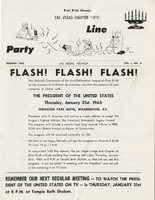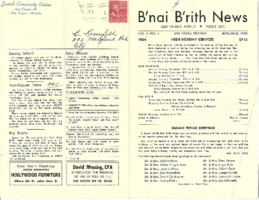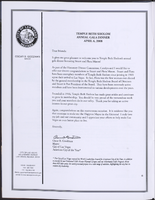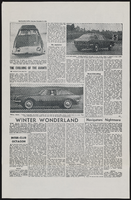Search the Special Collections and Archives Portal
Search Results

June Monroe and Kazuko Atomura oral history interview: transcripts
Date
Archival Collection
Description
Oral history interviews with June Monroe and Kazuko Atomura conducted by Cecilia Winchell and Stefani Evans on July 14 and July 19, 2022 for Reflections: the Las Vegas Asian American and Pacific Islander Oral History Project. In the first interview, Kazuko Atomura describes her childhood in Taiwan and Tokyo, Japan, and shares both happy and difficult mememories of that time. Atomura eventually moved to Los Angeles, California, where she reconnected with a man she previously met in Japan. She married him and together had their daughter, June Monroe, and another son while living in Corpus Christi, Texas. After difficult medical procedures involving Atomura's husband and Monroe's younger brother, Brian, the family relocated to Las Vegas, Nevada. Monroe recalls attending Las Vegas High School and Bonanza High School, and the struggle of making new friends as a young person. In the second interview, the mother and daughter discuss racism, discrimination, and identity. Kazuko Atomura recalls her many experiences with discrimination as a result of both her appearance and language barriers. June Monroe discusses how she came to be proud of her Japanese heritage, while Atomura discusses some of the community activities she has been involved in since living in Las Vegas including the Japanese Culture Club and odori dancing. Then, both Atomura and Monroe discuss Monroe's brother, Brian, who received two kidney transplants; one from Monroe's father and one from Monroe herself. Atomura talks about the shrines she has built for Brian, the experience of him being on dialysis, care taking, and his final days. Monroe shares about her activism with organ donation, being regularly involved with the Nevada Donor Network and helping to pass significant pieces of legislation within the area of organ donation.
Text

Herman Jimerson, Ruth Jimerson-Carter, and Leon Carter Jr. oral history interview: transcript
Date
Archival Collection
Description
Herman Jimerson and his younger sister Ruth Jimerson-Carter, along with her husband Leon Carter Jr., gathered on March 3, 2021, to talk about their memories and experiences growing up in West Las Vegas—the Westside.
OH-03746 contains additional interviews with the Carter family that are not transcribed in this document. Contact special.collections@unlv.edu for more information.
Text
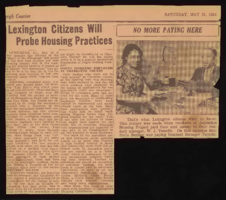
Housing Authority of Williamson, West Virginia: scrapbook, work notes, correspondence, and newspaper clippings
Date
Archival Collection
Description
Folder of materials from the Mabel Hoggard Papers (MS-00565) -- Civic engagement file. Includes a scrapbook, work notes, correspondence, and newspaper clippings related to Mabel Hoggard's employment at the Housing Authority of Williamson, West Virginia.
Mixed Content

Isaac Barrón oral history interview: transcript
Date
Archival Collection
Description
Oral history interview with Isaac Barrón conducted by Maribel Estrada Calderón and Claytee D. White on March 27, 2019 for the Latinx Voices of Southern Nevada Oral History Project. Isaac Barrón was born and raised in Las Vegas, Nevada. His father entered the United States as a Bracero. Barrón attended Rancho High School and earned his bachelor's degree in secondary education from UNLV. He currently teaches history at Rancho High School and serves as North Las Vegas' Councilman. In this oral history, Barrón recalls his youth in North Las Vegas, navigating the presence of gangs, and his path to being a community activist and advocate for North Las Vegas youth. He has led volunteer efforts for community improvement projects, including the plans for a new public library. He holds the distinction of being the first Latinx member of the North Las Vegas City Council and Southern Nevada's first Hispanic Mayor Pro Tempore. In 2013, he was elected to represent Ward 1 and was reelected for a second term in April 2017. He discusses being Mexican American, the Coalition of Pan American Organizations, the Hispanic Student Union, the Bracero Program, and Rancho High School.
Text
Charles S. Sprague and Benjamin Gill Papers on Nevada Mining
Identifier
Abstract
The Charles S. Sprague and Benjamin Gill Papers on Nevada Mining (1904-1925) are comprised of various records from the mining companies owned and operated by businessmen Charles S. Sprague and Benjamin Gill who were active in the central Nevada boomtowns of Goldfield and Tonopah in the early twentieth century. Documents include correspondence, receipts and invoices, detailed records and copies of government legislative bills relating to the mining industry, and other business correspondence. Sprague's collection consists of his mining business correspondence dating from 1906 to 1925. Gill's papers are comprised of his business correspondence from 1916 to 1922.
Archival Collection


